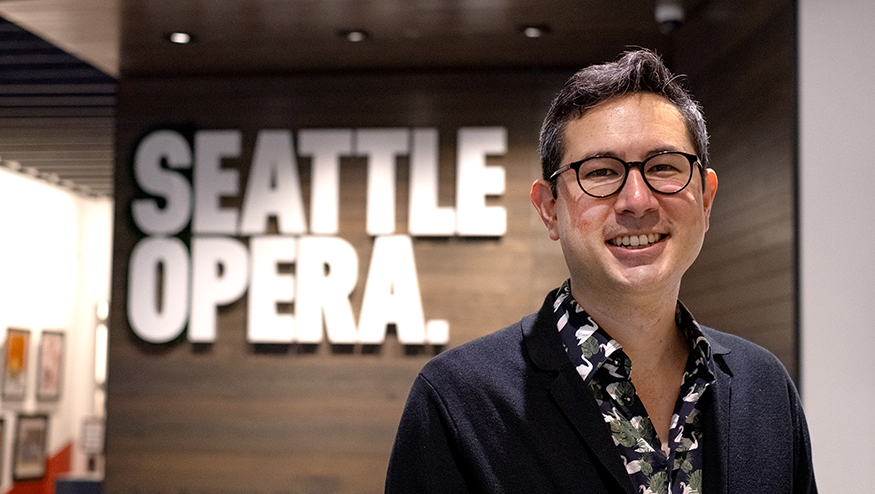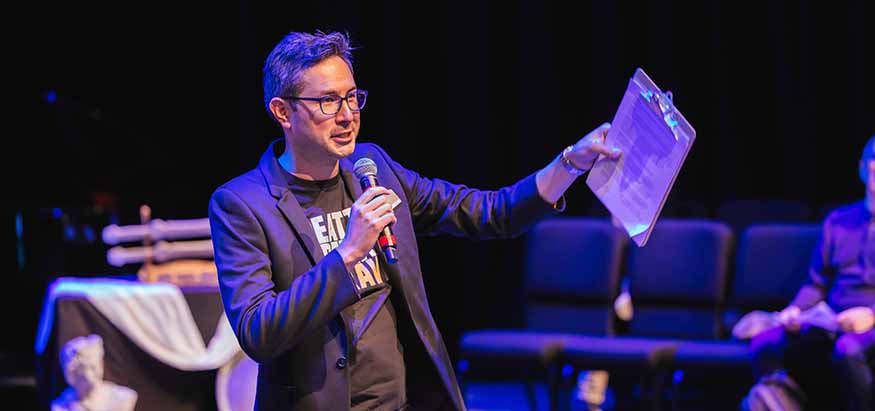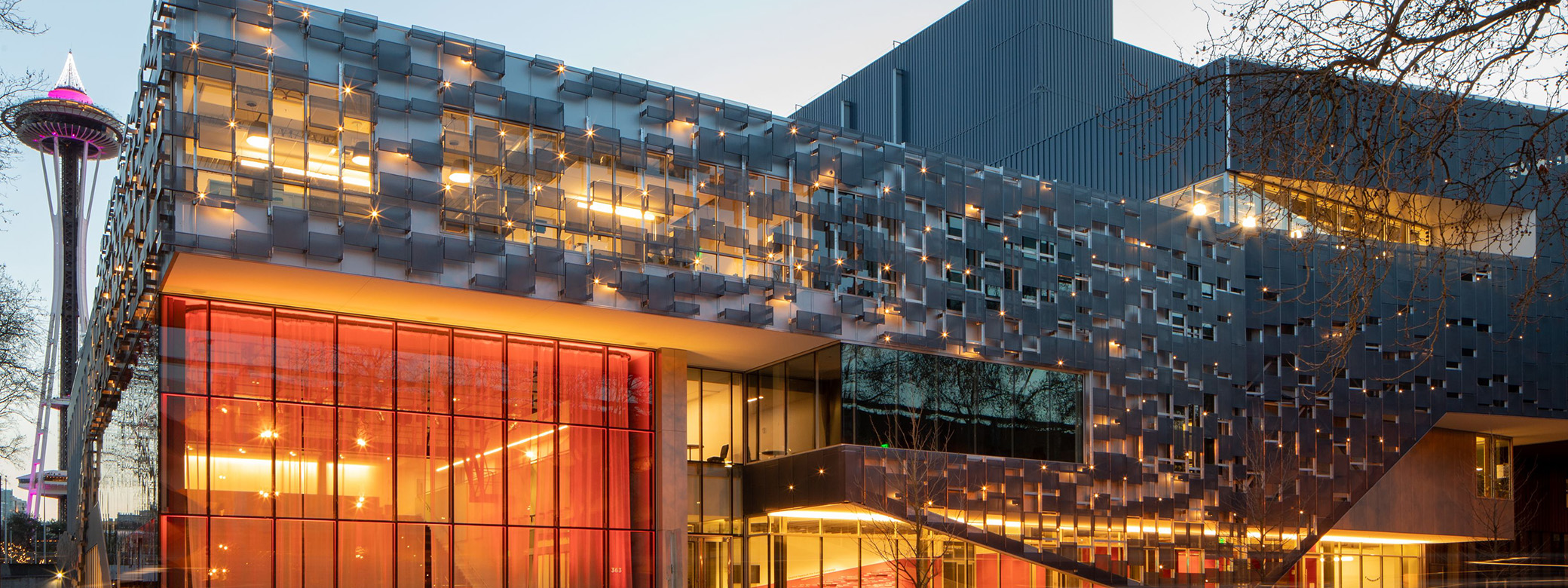
Name an opera, classical or contemporary. Odds are Lōkela Alexander Minami has seen it performed.
Since being introduced to opera as a high school student from Kāne‘ohe, Hawai‘i, Minami (BA, Political Science, German Language & Literature, 2010; MA, International Studies: Middle East, 2012) figures he has attended more than 100 operas, many of them multiple times. Now he’s turned his passion for opera into a career, serving as associate director of community engagement at Seattle Opera.
That might seem an obvious choice for an opera lover, but Minami never imagined a career in the arts. He previously worked for nonprofits focused on language education and international understanding. As a UW student, he had envisioned a career in law or international affairs. He’s still not counting those out.
“I’ve always approached life with a sense of curiosity, open to whatever surprises may come along,” Minami says. “I will continue being open to whatever journey life decides to take me on.”
The World as Classroom
Minami chose the UW because his aunt, an alumna, lived in Seattle. “People from Hawai'i tend to go to college where there’s family,” he says. “I knew next to nothing about the University of Washington, but I took a chance and trusted that everything would work out. And it certainly did.”

He started with a political science major, then added a second major in German language and literature after taking German to fulfill a language requirement. It was a study abroad program in Vienna that won him over.
“My mind was blown wide open during that study abroad in Vienna,” Minami recalls, “and I was so fascinated by everything I encountered in my German and art history classes. Learning a language is inseparable from learning about people and culture and history and ideas, and that’s what I really loved.”
After earning his BA, Minami pursued a master’s in the Jackson School of International Studies, focusing on the Middle East. With the support of a Foreign Language and Area Studies Fellowship, he completed an Arabic language requirement by spending three months in Cairo, arriving right after the fall of the Mubarak regime.
“Egypt was in the midst of a revolution,” Minami says. “There was no president, no parliament. What stands out to me most from that time is the resilience of the Egyptian people, and how society kept functioning in the absence of government. I have an appreciation now for people’s ability to just get on with it.”
Embracing Change — and Opera
Buoyed by his experiences with language and international study, Minami took a job with OneWorld Now! after graduating. The Seattle nonprofit offers language, global leadership, and study abroad programs for high school students. He then moved to NorthWest Student Exchange, where he helped German and Austrian students prepare for study abroad in the US. For both nonprofits, Minami served in administrative roles. He then brought his administrative skills to the Seattle Opera.
“One of the things I’ve come to learn is that administrative and program management skills for nonprofits are transferrable across the board,” he says.

At Seattle Opera, Minami manages a variety of community programs. He teaches a six-session Opera 101 course; finds speakers for the opera’s pre-show talks (and presents some himself); and coordinates Seattle Opera’s Community Conversations series, which explores broad societal themes in opera.
Through all these programs, Minami contextualizes opera through a contemporary lens. In Opera 101, he shines light on a long history of misogyny and cultural appropriation in opera, and how that is being addressed. A recent Community Conversations panel, held during the run of the gender-bending opera “Alcina,” focused on gender fluidity in opera, including historical context.
“There’s a sea change that’s happening in the classical music world,” Minami says. “The entire opera industry in America is realizing that the old ways are not working anymore.”
Minami is excited to be part of that change. “A lot of my work is building bridges and connections and breaking down barriers,” he says. “I’m also working to undo long legacies of harm and exclusion in the opera industry.”
Leading with Patience and Humility
In the past, building connections meant telling communities why they should love opera and encouraging the purchase of tickets. Seattle Opera now approaches community engagement differently.
“People don’t fundamentally care about opera if they haven’t been exposed to it,” Minami says. “And the way to expose them is not to give some lecture about it but instead build relationships with communities and become a resource that can materially impact lives. So when we meet with community leaders now, we ask, ‘What’s important to you? What are the issues you’re facing in your community, and how can we bring the artistic and production assets of Seattle Opera to be in service of your needs?’”
It’s about rebuilding relationships that had been broken for centuries in this industry. ...I love that we’re forcing ourselves to change the way we do things.
A recent example: In December, Seattle Opera hosted Black Artists Market, a holiday craft sale at Seattle Center featuring Black vendors, in connection with an upcoming production of “X: The Life & Times of Malcolm X,” the first opera by a Black composer to be presented on Seattle Opera’s main stage. The idea grew out of meetings with business and cultural leaders in the Black community. Black opera singers performed during the market, but the primary purpose was to support the community.
Such an approach requires patience and humility, says Minami. “It’s about rebuilding relationships that had been broken for centuries in this industry,” he says. “It’s not going to happen overnight. I love that we’re forcing ourselves to change the way we do things.”
As a UW student, Minami spent many hours thinking about career options. He’s happy with how things turned out, but there’s one thing he’d do differently.
“Rather than worrying about what field to go into, it’s best to figure out what your values are and what kind of positive change you want to make in the community and the world,” he says. “Once you have that as an anchor, everything else will fall into place.”
More Stories

Finding Love at the UW
They met and fell in love as UW students. Here, 10 alumni couples share how they met, their favorite spots on campus, and what the UW still means to them.

AI in the Classroom? For Faculty, It's Complicated
Three College of Arts & Sciences professors discuss the impact of AI on their teaching and on student learning. The consensus? It’s complicated.

Bringing Music to Life Through Audio Engineering
UW School of Music alum Andrea Roberts, an audio engineer, has worked with recording artists in a wide range of genres — including Beyoncé.
